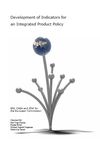Final Report: Development of Indicators for an Integrated Product Policy
This study takes its beginning in the search for indicators with relevance to Integrated Product Policy (IPP). IPP has been underway for some time in many
European Member States and in various forms. This has provided experience
for a common European policy in the field, but so far, no experience can be
brought forward on how to monitor the effects of IPP on society.
Therefore, the European Commission issued a call for tender in 2003, and this
report is the result. The report is structured in the following way:
- Firstly, the literature on relevant methodology for indicators and IPP aspects, plus the literature on indicators with relevance to IPP is described.
- Secondly, the results of this literature survey are discussed.
- Thirdly, the experience is used to develop criteria for selecting product groups, and data collection on some products is tested and described.
- Finally, from the experience so far, a Basket of products, suitable for monitoring the progress of IPP is suggested and discussed.
The results of the literature study are that the field of indicators for IPP has not
yet been developed. Much has been developed, however, for sustainable development,
and indicators from this field may be relevant to IPP. The DPSIR
model1 for indicators may be suitable for an IPP strategy. However there seems
to be a missing link in the DPSIR cycle from knowledge about policy effectiveness
in its pure form (called policy dissemination) to knowledge about the
changes in driving forces (industrial activities) from IPP activities. The P-S-I
part of the DPSIR cycle is covered by technical impact assessment methodologies
developed over the last decade. The key of the missing link may be found
in the field of organisational behaviour or related research areas. This area of
knowledge does not seem well enough developed at the moment to deduce
quantitative understandings of causality, which can help us in monitoring the
progress of IPP.
You can download the study



